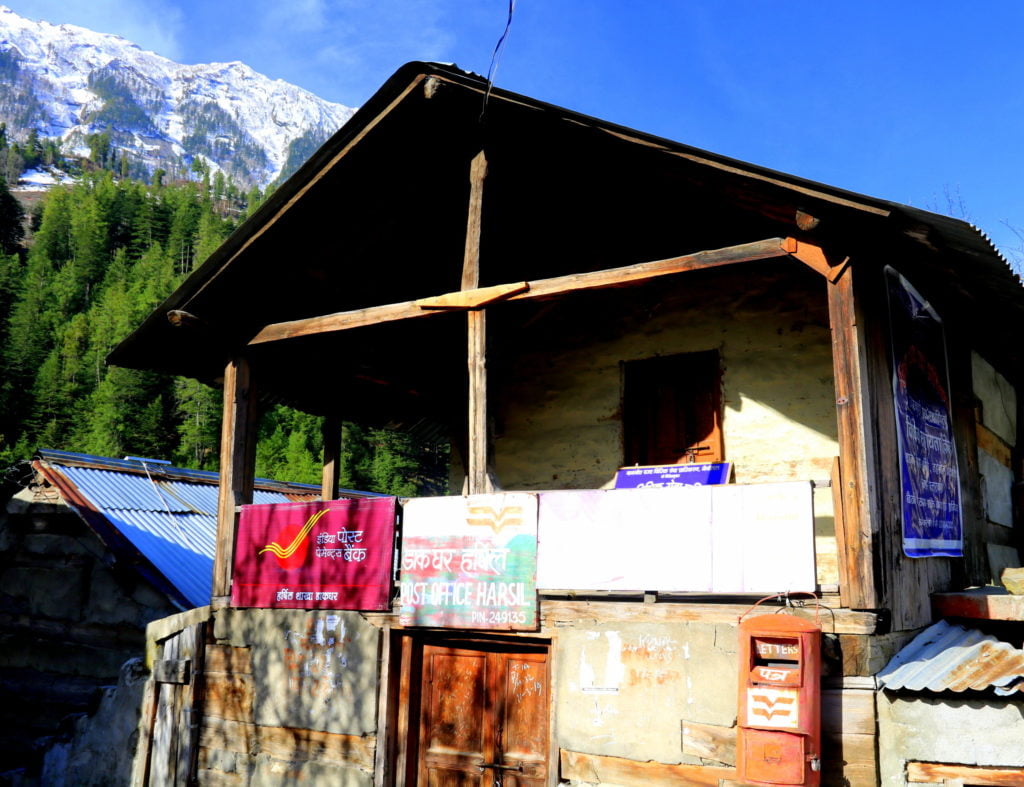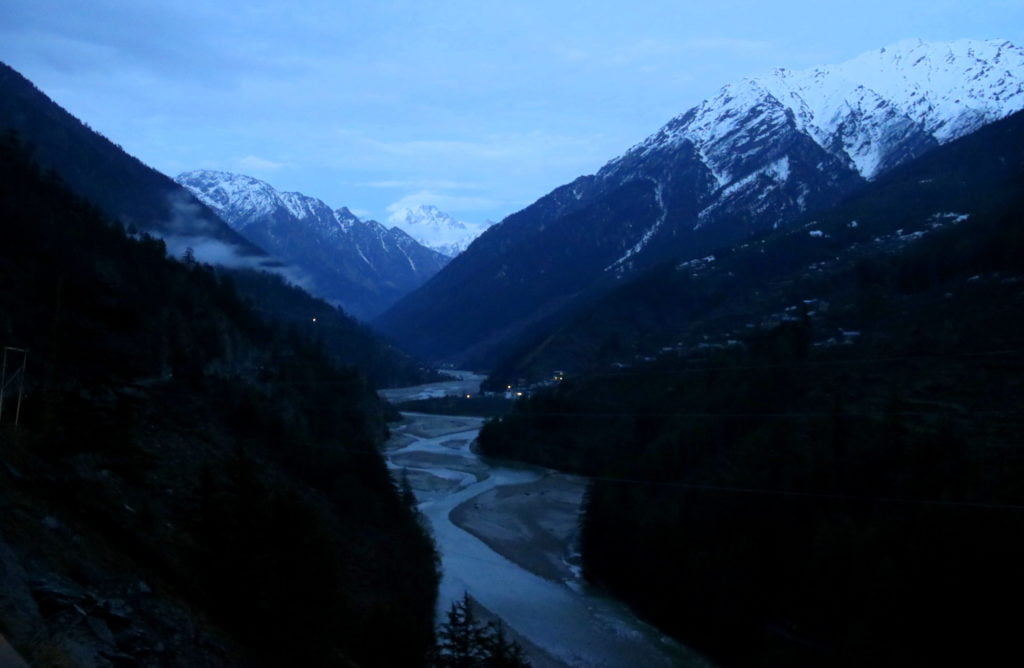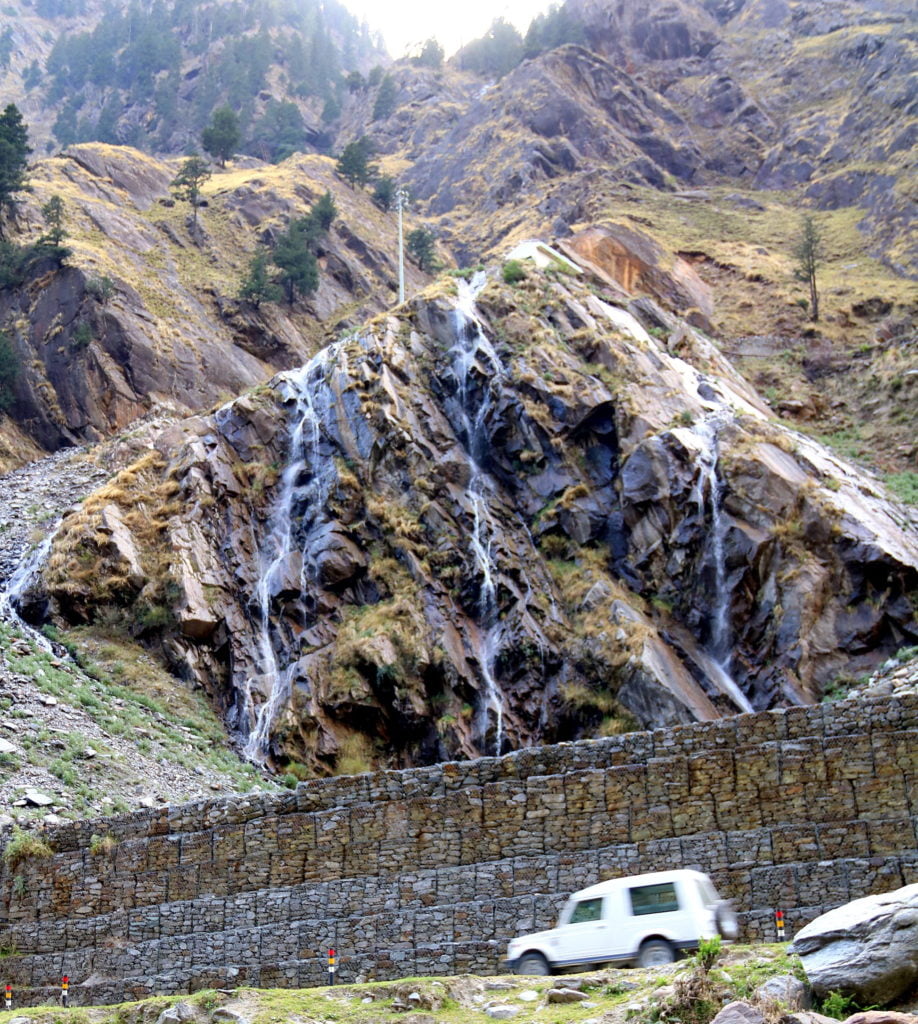If you have done the usual mountain tourist trail to death, the usual commercial hill destinations or resorts, I mean the likes of Shimla, Mussoorie, Nainital or for that matter even Ladakh (post 3 idiots movie rush for it) and the rest, and you are looking for something different yet beautiful, then I would suggest Harsil.
Harsil had been on my ‘to do’ list for a long time and finally last week it happened for me.
The small village of Harsil has a near perfect setting. It is located at the bottom of the Bhagirathi river valley, sharing the valley bottom with the crystal-clear river. It is hemmed in by tall snowclad mountains from all the directions, is crisscrossed by a number of pristine mountain streams, with its little wooden post office and houses, basic homestays and apple orchards and its little sleepy market square. A perfect place to soak in nature’s bounty, observe and absorb and to do pretty much nothing more.

Harsil is on the popular Gangotri Pilgrim track which is part of the Char Dham Yatra. It is located just 27 kilometres before Gangotri. Approach to Harsil is announced by numerous waterfalls and pockets of snow along the road, even in the month of April. The road about 50 kilometres from Harsil becomes twisted, narrow and rough. But the views you will encounter on this stretch will be much more rewarding than the rough ride.

Harsil is at a distance of 243 from Rishikesh. From Rishikesh, one can reach Harsil through a route that goes through Chamba, Tehri Dam, Uttarkashi and Gangnani. As of now the road up to Chamba is going through a major relaying and in various sections, right up to Harsil. An alternative would be to take the Dehradun-Mussoorie route towards Tehri.
The elevation of Harsil from sea level is 2620 m, which is 300 meters more than Shimla. But still, Harsil is not located on top of a ridge, like Shimla, but is at the bottom of a valley, sharing space with Bhagirathi.
BEST TIME TO VISIT
Harsil is best visited through a narrow window of March 15 to April 30, that is just before the Char Dham Yatra begins or a few days after it begins. And then in September and October, before the winter sets in. Harsil can still be visited during Yatra months, that is from May to September, but then, expect the accommodations to be full, and it is a good idea to book in advance.
THE STORY OF ENGLISH RAJA & APPLES
Harsil is famous for its apple orchards. The story of Harsil’s apple is essentially the story of Fredrick E. Wilson, popularly known locally as Pahari Wilson or English Raja. In the words of Rudyard Kipling, he “lived a life that would have been the envy of the kings.” As the story goes, Wilson was the first white man to permanently settle in Bhagirath Valley.
Born in the town of Wakefield in Yorkshire, England, 1817, Wilson was serving with the British army when he turned a deserter during the British Afghan war (1839-43). Penniless and hunted by the authorities he escaped to the high mountainous region of Gharwal.

He arrived in Mussoorie in 1841 and had the first look of the Gharwal Himalayas from the Mussoorie’s high point of Lal Tibba. Moving further in, he reached Harsil and settled there.
He soon met with the King of Tehri Gharwal and took a contract of timber from him. Soon he was cutting down huge forests of Deodars around Harsil and sending the wood floating down on the river for the British, who needed the timber for their massive railway projects. Later on, he is said to have helped the British during the revolt of 1857 also known as the first war for independence. His improved relations with the British meant he was soon forgiven for his desertion and now lived a bigger life.
Wilson was so successful in this timber trade and started to dominate the area to such an extent that he even minted and issued his own coins. Soon he also introduced Apple (giving the region its biggest cash crop and uplifting the local economy), potato and green bean in the area. Built several bridges in the area including a 350 feet suspension bridge over Jadh Ganga in Bhaironghati. All these made him a popular figure in the region and a sort of legend om his own lifetime.
Recently, a Swiss writer Robert Hutchison wrote a biography of Wilson titled ‘Raja of Harsil, the legend of Fredrick Pahari Wilson.’ Noted heritage writer R.V Smith has also written extensively about the legend of Pahari Wilson.
Wilson once settled in Harsil, married a beautiful Pahari girl Gulabi from the nearby village of Mukhba. Gulabi was his second wife, who bore him three sons. His first wife was Raimatta, who is also said to be from Mukhba village and was said to be even more beautiful, but she remained childless.
He constructed a huge Bungalow in Harsil, known as Wilson cottage, in the 1850s. He died on July 24, 1883, and he and his wife were buried in Camel Back road Mussoorie cemetery.
The people of Harsil even today talk about the legend of Pahari Wilson. But some people do not see him in a positive light. He is accused of denuding the Harsil region of its pristine forest and hunting down almost all wild animals, inspired purely by his greed.
It is said that the local god Lord Someshwar cursed him for his nature destroying act. The curse said that Wison’s sons would waste his fortune and his line will end with them. Which is exactly how it transpired. But still, every winter Harsil Valley gets decked up beautifully with Wilsons bright red apples.
THINGS TO DO
Most of the doing you have done by just reaching here. So now, all you need to do is put your feet up, contemplate the view and just throttle any desire to do anything hectic. A leisurely stroll would suffice the doing here. A stroll along the Bhagirathi or in any other direction will grant you encounters with beautiful scenery. Also, pick a sunny spot along a couple of other streams that crisscross Harsil, and spend some time hearing the sound of burbling splashing spluttering water on the rocks.
Cherry blosom in Harsil
Look at it and enjoy it. If you are feeling adventurous then try and pick a trail on the mountain slope, and reach some hamlet high above.
Thankfully, the adrenaline rush and commercialisation of mountain sports is yet to reach here.
Mukhba Temple
Located in a village some 3 kilometres above Harsil, (reached by a motorable road) Mukhba temple is the winter home of Goddess Ganga. Every year, post-Diwali closing of the gates of the Gangotri Temple, the goddess is brought to the Mukhba temple for the winter months. The Mukhba temple looks very similar to the Gangotri Temple. It is a nice spot with excellent views. Surely worth a visit.
WHERE TO STAY & EAT
A great meal we had in a tiny establishment for just 90 bucks, incuded unlimited rice, dal and curry plus a plate of fish curry….simply too good
Government run GMVN has a good guest house that is spectacularly located with the river running along on two of its sides and is well spread out. The palace has hot water but serves food only during Yatra months.

The village has a few other private run homestays with a couple of them quite alright. We stayed at Sunder Homestay, which offered us two double bedrooms with attached bathrooms and hot water, plus a kitchen space for Rs 5600 per night. This included all the meals. The village otherwise has a few other eating options in small restaurants which provide basic but good food.
Reposted from Travel Bug Asheesh


